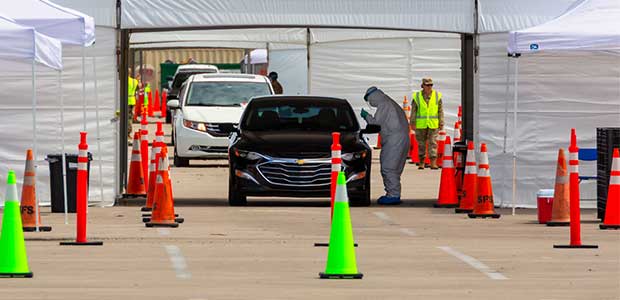
Big Tech Companies are Helping Employers Test Workers
As businesses continue to grapple with the question of how to reopen safely, a number of big tech names are stepping up and offering testing and contact tracing COVID services to employers.
Returning to work means rethinking a number of safety and health precautions, and companies are trying to figure out how to conduct testing, do contact tracing and enforce social distancing. Earlier this summer, however, a handful of big tech companies like Fitbit and Verily stepped up to provide companies with health-vetting, workforce tools.
Verily Life Sciences, a sister company of Google, worked quickly to introduce a free coronavirus-screening site for the public and set up testing location in March earlier this year. It took some time to work efficiently, but as of June (a whole two months ago), it had helped 220,000 people get testing in 13 states.
Since then, Verily has worked towards helping employers by introducing a health screening and analytics service for businesses trying to safely reopen during the pandemic. Earlier this year, Verily announced an app-based health screening service for businesses and schools called Healthy at Work.
The app provides COVID-19 diagnostic testing for employees and makes recommendations to employers about how often employees should be retested based on local health data and test results.
“Employers are really focusing on how to ensure that they are not the source of another outbreak,” said Dr. Vivian Lee, the president of health platforms at Verily, a unit of Google’s parent company, Alphabet. “And that they do not wind up in a situation where they’re putting the safety of their employees at risk when they need to be back in an office or a workplace setting.”
Other big tech companies are following Verily’s lead. For example, Microsoft and the larger insurer United Health Group recently collaborated on a free symptom-checking app that helps target workers at risk for the virus and recommend testing resources.
Fitbit introduced a program that includes a daily symptom-checking app for employees and a work force health-monitoring dashboard for employers.
Kogniz, an artificial intelligence start-up, announced a thermal camera system as coronavirus fever-screening and “social distancing enforcement” tools for the workplace.
The good news is that employers have a number of options to track and record their employees’ health. The bad news is that the options can be overwhelming. Plus, as senior analyst Jeff Becker said, “it’s a fractured ecosystem, much like traditional health care.”
Then there is the issue of the possible one-quarter of people who have the virus and are asymptomatic. This means that symptom-checking apps and fever-scanning cameras would not detect if an asymptomatic person had COVID.
“Things like fever checks, fever screening — those things are actually not going to prevent transmission in a workplace setting,” said Caroline Savello, the chief commercial officer at Color, which recently introduced a testing program for employers.
Federal authorities have provided little guidance for businesses on testing employees for coronavirus. In May, the CDC published guidelines on “Resuming Business”, which recommended that employers prepare a “plan for conducting daily in-person or virtual checks” (symptom and/or temperature screening) before employers enter the workplace. However, the guidelines did not speak much to employee testing.
However, there is much concern that these testing methods will not track asymptomatic individuals, and that testing may give people a false sense of security and cause them to loosen their caution measures.
As the pandemic continues and companies continue to grapple with the question of reopening safely, employers need to make sure they are actively trying to protect employees—and that includes looking into testing options from third party, big tech companies.